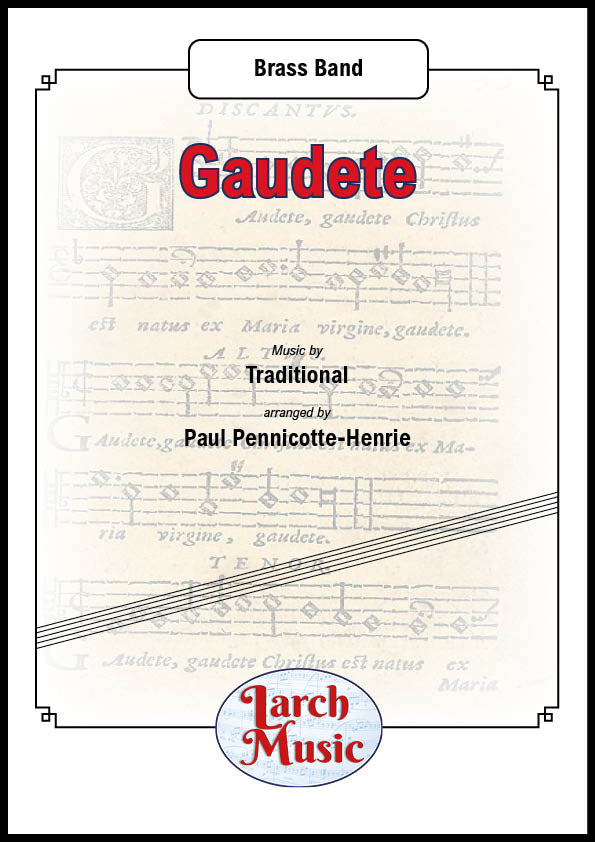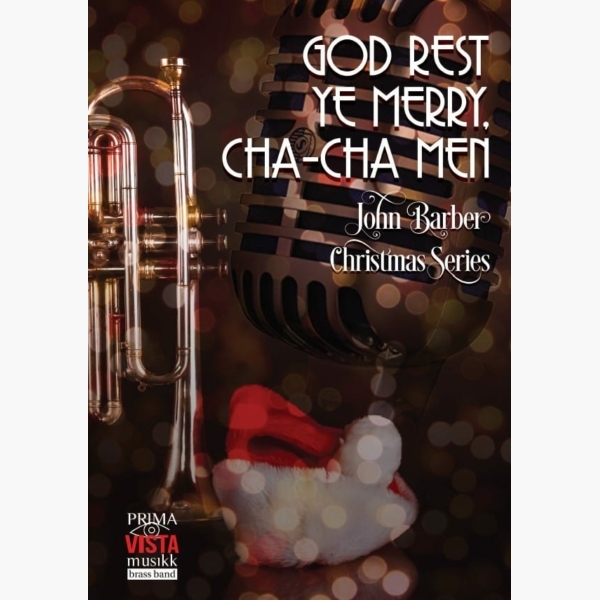Results
-
 £30.00
£30.00Gaudete - Brass Band - LM389
COMPOSER: TraditionalARRANGER: Paul Pennicotte-HenrieGaudeteis a sacredChristmas carol, thought to have been composed in the 16th century.It was published inPiae Cantiones, a collection of Finnish/Swedish sacred songs published in 1582.No music is given for theverses, but the standard tune comes from olderliturgical books.Suitable Section 4 Upwards
In Stock: Estimated dispatch 3-5 working days
-
 £29.95
£29.95The Bleak Midwinter - Paul Lovatt-Cooper
The Bleak Midwinter is an arrangement of the famous Christmas Carol by Gustav Holst with words from the poem by Christina Rossetti. IT has been arranged for Bb soloist circa 3.40
Estimated dispatch 10-14 days
-
 £24.95
£24.95God Rest Ye Merry, Cha-Cha Men - 16th Century English Traditional - John Barber
God Rest Ye Merry, Cha-Cha Men is a reworking of the traditional English Christmas carol God Rest You Merry, Gentlemen. Veering away from the original with the help of a driving Cha-Cha beat, a piano Montuno line in the baritones...
Estimated dispatch 5-7 working days
-
£34.95
KINGS OF SWING (Brass Band Set) - Kevin Larsson
The opening features a cornet, trombone and tuba trio, intended to be the three kings, as they swing their way to Bethlehem using the classic Christmas carol, 'We three kings of Orient are'.
Estimated dispatch 7-14 working days
-
£60.99
Chorale and Canzone - Hans Leo Hassler - Jan de Haan
The words and lyrics of the Christmas Carol From Highest Heaven I Come To Tell were written by the great Martin Luther (1483-1546) and can be found in The Hymns of Martin Luther. Martin Luther expressed radical views which began the reformation movement. His followers protested at the treatment given to Martin Luther, the event from which the term 'Protestant' was derived. It was first published in Joseph Klug's Gesangsbuch in around 1535. Add a majestic Baroque feel to any concert with this simple yet effective arrangement.
Estimated dispatch 5-14 working days
-
 £54.99
£54.99Oxford Intrada - Jan de Haan
The sparkling Oxford Intrada is based on the well-known Christmas carol O Come All Ye Faithful. The piece takes its name from the place where it was first performed, namely Oxford Cathedral in England.
Estimated dispatch 5-14 working days
-
 £60.99
£60.99Macht hoch die Tur - Traditional - Jan de Haan
This Christmas carol arrangement consists of two continuous parts: Introductie and Koraal. Jan de Haan has orchestrated the hymn Macht hoch die Tur and has added his own introduction based on the melody.
Estimated dispatch 5-14 working days
-
 £69.99
£69.99Auld Lang Syne - Menno Haantjes
Whereas 'Auld Lang Syne' may be considered the best-known Scottish song ever, yet at the same time it is an obscure one, for there are but few people who know the complete text by heart. After the familiar 'Should auld acquaintance be forgot .....' many people take their refuge to lyrics like 'rum tee dum ta dee ..... lah, lah, lah ........... for auld lang syne'. Even in Scotland only a handful of persons know the entire text and are able to give a correct rendering of it. The current lyrics have been attributed to the Scottish poet Robert Burns. Burns, however, he did not write the whole poem : after he had heard an old man sing the centuries-old Scotchballad, he wrote it down and added a number of stanzas (1788). Historical research teaches us that the ballad served many purposes, both political and religious. Nowadays, 'Auld Lang Syne' is sung as a Christmas Carol and it is also sung on New Year's Eve at the turning of the year. Apart from that, though, the song is also sung on many other occasions sometimes with different lyrics, which usually have Love, Friendship and/or Parting as their themes, as these go well with the fascinating melody. In this arrangement a low-sounding solo instrument is central. The harmonization in the accompaniment fits in perfectly with the sentiments this song will evoke. Should auld acquaintance be forgot And never brought to mind? Should auld acquintance be forgot. And days of auld lang syne? For auld lang syne, my dear, For auld lang syne, We'll take a cup of kindness yet, For auld lang syne.
Estimated dispatch 5-14 working days
-
 £69.95
£69.95Dance Music (Brass Band - Score and Parts) - Downie, Kenneth
This music takes the form of a suite in four movements. The ever-changing spirit of the dance is reflected in the contrasting styles of each movement, ranging from the gentle lullaby to more boisterous and lively moods. Careful listeners will identify references to dance-associated tunes in each movement, concluding with the Christmas carol, 'Tomorrow shall be my dancing day'. The music is planned to be versatile and any one movement could be performed as a stand-alone item if required.
Estimated dispatch 7-14 working days
-
 £34.95
£34.95Dance Music (Brass Band - Score only) - Downie, Kenneth
This music takes the form of a suite in four movements. The ever-changing spirit of the dance is reflected in the contrasting styles of each movement, ranging from the gentle lullaby to more boisterous and lively moods. Careful listeners will identify references to dance-associated tunes in each movement, concluding with the Christmas carol, 'Tomorrow shall be my dancing day'. The music is planned to be versatile and any one movement could be performed as a stand-alone item if required.
Estimated dispatch 7-14 working days

